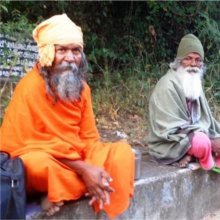Kollimalai, Koḷḷimālai: 3 definitions
Introduction:
Kollimalai means something in the history of ancient India, Tamil. If you want to know the exact meaning, history, etymology or English translation of this term then check out the descriptions on this page. Add your comment or reference to a book if you want to contribute to this summary article.
Images (photo gallery)
India history and geography
Source: DSpace at Pondicherry: Siddha Cult in Tamilnadu (historical)Kollimalai or the Kolli hills (11°14’N; 78°20’E) is located in the Salem district of Tamilnādu. It is famous, because of the Siddhars who stayed there are popularly known as Kollimalai Siddhars[818]. The Arappālīśvara temple is situated on the top of the Kolli Hills, dedicated to Lord Śiva and Goddess Tāyāmbal. It is an ancient temple, sung by the Tevāram Saints.
The Kolli hill itself is famous for a beautiful sculpture of Pāvai, often referred to in early Saṅgam literature as Kollippāvai. A sculpture is now identified as Kollippāvai but it seems to be an image of Kāḷi of the Colā period. From time immemorial, the Śiva temple has been held in high veneration by a Śaivite saint and his followers and is one of the foremost sacred sthalas in the Koṅgu country.
Source: Shodhganga: Siddha Cult in TamilnaduKollimalai refers to one of the various famous Siddha Centre distributed throughout South India and Tamil Nadu. The Siddha cult represents a Tantric philosophy that emerged from the combination of several elements found in traditions such as Shaivism (viz., Pashupata), Shaktism, Jainism, Tantric Buddhism (Vajrayana), etc. Both the Siddha and the Navanath cult (i.e., Nava-natha, ‘nine saints’) are popular in South India [viz., Kollimalai] and Tamilnadu. A Siddha was an inspired seer belonging to the marginalized sections of society who dissolved their past karma and crushed the roots of future karma.

The history of India traces the identification of countries, villages, towns and other regions of India, as well as mythology, zoology, royal dynasties, rulers, tribes, local festivities and traditions and regional languages. Ancient India enjoyed religious freedom and encourages the path of Dharma, a concept common to Buddhism, Hinduism, and Jainism.
Languages of India and abroad
Tamil dictionary
Source: DDSA: University of Madras: Tamil LexiconKoḷḷimālai (கொள்ளிமாலை) [koḷḷi-mālai] noun < idem. +. Wreath of flowers laid upon a corpse; பிணத்திற்கு அணியும் மாலை. கொள்ளிமாலையுங் கொடிபடு கூறை யும் [pinathirku aniyum vaithiya malaiyagarathi kollimalaiyung kodipadu kurai yum] (மணிமேகலை [manimegalai] 6, 94, உரை [urai]).
Tamil is an ancient language of India from the Dravidian family spoken by roughly 250 million people mainly in southern India and Sri Lanka.
See also (Relevant definitions)
Relevant text
Search found 3 books and stories containing Kollimalai, Koḷḷimālai, Koḷḷi-mālai, Kolli-malai, Kollimaalai; (plurals include: Kollimalais, Koḷḷimālais, mālais, malais, Kollimaalais). You can also click to the full overview containing English textual excerpts. Below are direct links for the most relevant articles:
Middle Chola Temples (by S. R. Balasubrahmanyam)
Temples in Tiruchchengodu < [Parantaka I]
Later Chola Temples (by S. R. Balasubrahmanyam)
Introduction < [Chapter IX - Rajadhiraja II (a.d. 1166 to 1182)]
Temples in Nagar < [Chapter X - Temples of Rajadhjraja II’s Time]
Temples in Srirangam < [Chapter II - Temples of Kulottunga I’s Time]
Early Chola Temples (by S. R. Balasubrahmanyam)
Introduction < [Chapter VII - Uttama Chola, Madhurantaka]
